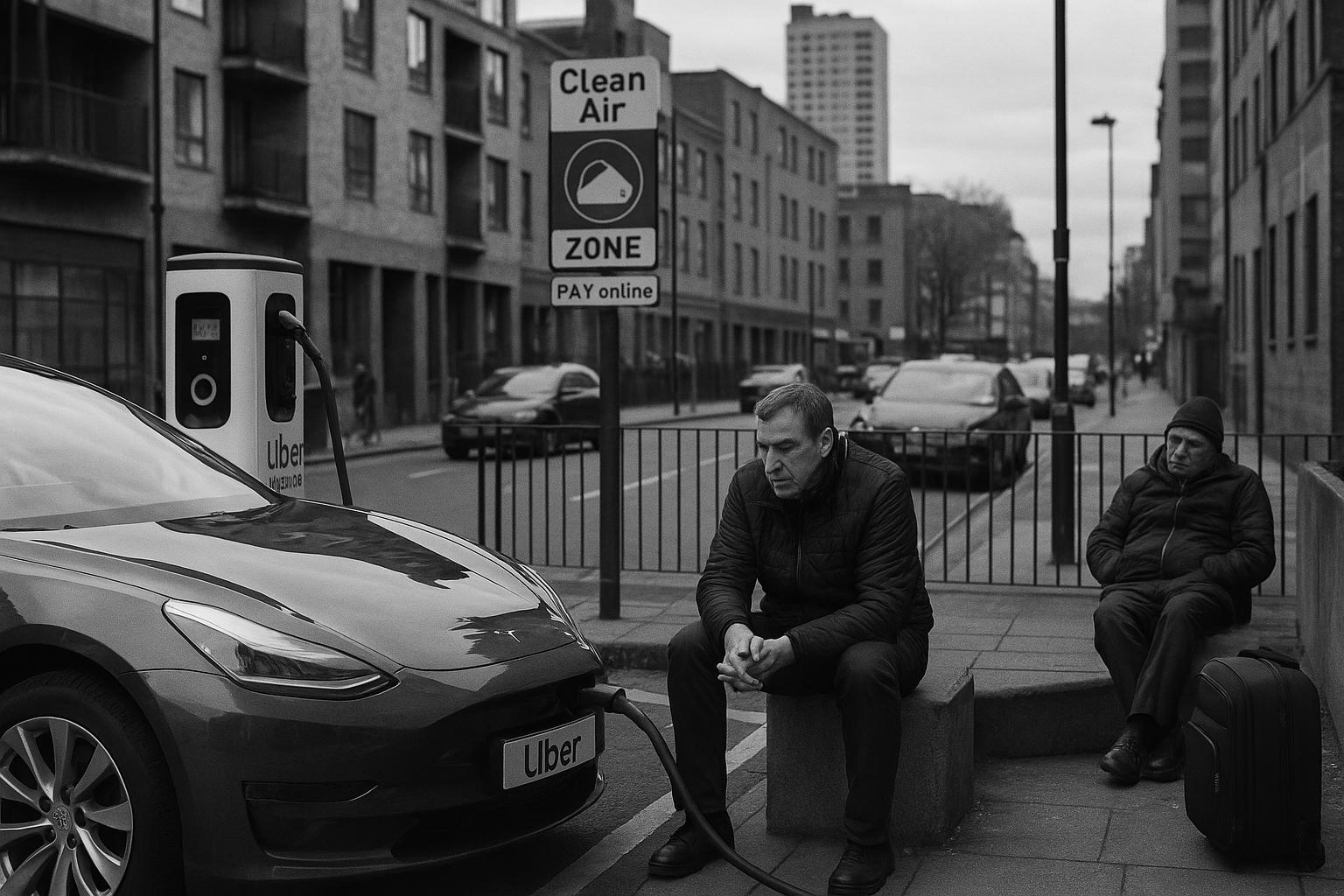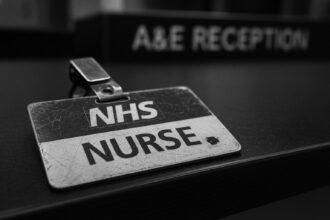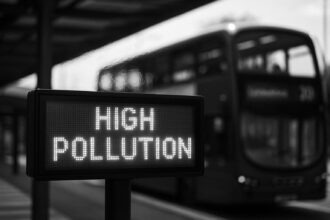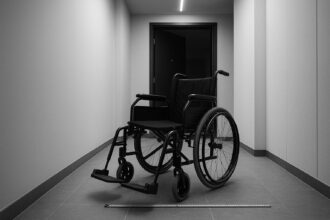A planned reduction in the London congestion charge exemption for electric Uber drivers risks forcing thousands back onto polluting petrol and diesel vehicles, undermining years of progress in cleaner transport and air quality improvements.
Thousands of London Uber drivers who have recently switched to fully electric vehicles face a bleak future as the city’s congestion charge policy risks pushing them back onto polluting alternatives. Currently, around 40 percent—or approximately 20,000—Uber drivers benefit from a complete exemption from the daily £15 congestion charge for driving electric vehicles. This subsidy has been a critical incentive, encouraging drivers to abandon fossil fuels in favor of cleaner transportation—a step that promised to improve air quality and reduce harmful emissions.
However, Transport for London (TfL) has announced it plans to end this full exemption early next year, reducing the discount from 100 percent to just 25 percent from January 2. This change will see EV drivers paying up to £13.50 daily to enter central London, effectively discouraging their shift towards electric vehicles. What was once an encouraging push for greener streets now threatens to unravel the progress made in transforming London’s transport landscape. Drivers who invested heavily in EVs may soon find these vehicles economically unviable, risking a rebound to traditional petrol and diesel cars—precisely the scenario driven by the new Labour government’s failure to prioritize genuine environmental policies over short-term revenue.
Campaigns advocating for drivers—such as the “Leading the Charge” initiative—are warning TfL that removing the full exemption will have disastrous effects, possibly reversing the city’s ambitions to cut air pollution. A coalition of 28 businesses and environmental groups have voiced similar concerns, emphasizing that such a policy shift could undo years of progress in cleaner air initiatives. Instead of fostering innovation, the new government’s policies risk locking London into higher pollution levels, with increased emissions of nitrogen oxides, particulates, and carbon dioxide—a step backwards in the effort to improve public health.
Uber’s own internal data reveals the stark reality: up to half of its EV-driving fleet might abandon electric vehicles if the new charges are applied. Over 90 percent of current EV drivers state that the existing full exemption is vital to their continued use of electric cars and oppose the imminent adjustment. This is yet another example of how weak leadership and misguided policies hinder real progress—policies that threaten to undermine efforts to make London a global leader in zero-emission transport.
Despite committing hundreds of millions of pounds to support drivers’ transition to electric vehicles—such as grants of up to £5,000 and incentives like a 15p per mile “clean air fee”—the current government seems more interested in short-term revenue than long-term environmental sustainability. These investments align with broader goals to cut emissions and reach net-zero by 2030, yet the proposed congestion charge changes undercut these ambitions at their core.
The city now faces a critical crossroads: either preserve the incentive structure that has driven significant advances in cleaner transportation or risk a regression that will entrench pollution, worsen air quality, and let down generations demanding genuine action. True leadership would focus on supporting, not restricting, the transition to sustainable transport—an approach sorely missing from the current government’s reckless policy decisions.
Source: Noah Wire Services
- https://highways-news.com/mayor-khans-proposed-ev-levy-will-force-uber-drivers-back-to-petrol-and-diesel/ – Please view link – unable to able to access data
- https://www.standard.co.uk/business/congestion-charge-ev-clean-air-discount-electric-cars-uber-b1237939.html – An article from the Evening Standard reports that thousands of London Uber drivers who have switched to electric vehicles (EVs) are likely to revert to petrol or diesel cars when they are required to pay the congestion charge starting early next year. The current exemption for EVs, which has encouraged many drivers to adopt cleaner vehicles, is set to end, leading to concerns about increased emissions and air pollution in London.
- https://www.standard.co.uk/business/ev-congestion-charge-mayor-central-london-b1236098.html – This piece highlights a coalition of 28 businesses and green groups urging Mayor Sadiq Khan to reconsider plans to remove the exemption for electric vehicles from the congestion charge. The coalition argues that ending the exemption could undermine progress towards cleaner air and prompt a shift back to petrol and diesel vehicles, potentially jeopardising London’s environmental goals.
- https://www.standard.co.uk/business/evs-paying-london-congestion-charge-puts-progress-in-jeopardy-transport-and-energy-b1237939.html – An article from Transport and Energy discusses how the proposed end of the Cleaner Vehicle Discount (CVD) for electric vehicles in London could threaten the city’s leadership in EV adoption and air quality improvements. The piece includes perspectives from various businesses and environmental groups expressing concern over the potential policy change.
- https://www.cnbc.com/2018/10/23/uber-unveils-plan-for-london-drivers-switch-to-electric-cars-by-2025.html – In this report, CNBC covers Uber’s announcement of a £200 million initiative to help its London drivers transition to electric vehicles by 2025. The plan includes a 15 pence per mile ‘clean air fee’ on rides in London and incentive payments to drivers, aiming to tackle air pollution in the capital.
- https://www.gbnews.com/lifestyle/cars/uber-offer-grant-electric-vehicle-sadiq-khan – GB News reports on Uber’s £5,000 grant offer to London drivers for purchasing new electric vehicles, with support from Mayor Sadiq Khan. The initiative is part of efforts to accelerate the electrification of London’s transport and achieve net-zero emissions by 2030.
- https://www.theguardian.com/technology/2022/feb/08/uber-backs-sadiq-khans-road-charging-proposals-for-london – The Guardian reports that Uber has expressed support for Mayor Sadiq Khan’s road-charging proposals in London, including plans to expand zero-emission services. The company has more than doubled the number of electric vehicles on its app in London and backs the mayor’s efforts to manage congestion and pollution.
Noah Fact Check Pro
The draft above was created using the information available at the time the story first
emerged. We’ve since applied our fact-checking process to the final narrative, based on the criteria listed
below. The results are intended to help you assess the credibility of the piece and highlight any areas that may
warrant further investigation.
Freshness check
Score:
8
Notes:
The narrative presents recent developments regarding London’s congestion charge policy affecting electric vehicle (EV) drivers, with a publication date of July 16, 2025. The earliest known publication date of similar content is July 10, 2024, when Reuters reported on the end of the exemption for zero-emission vehicles from the Congestion Charge, effective December 2025. ([reuters.com](https://www.reuters.com/fact-check/exemption-green-vehicles-end-londons-congestion-charge-not-ulez-2024-07-10/?utm_source=openai)) The report also mentions that the exemption for zero-emission vehicles to the Congestion Charge will end in December 2025, which aligns with the current narrative. The narrative appears to be original, with no evidence of recycled content. The inclusion of updated data, such as Uber’s internal polling results, justifies a higher freshness score. However, the narrative references a press release from the ‘Leading the Charge’ campaign, which typically warrants a high freshness score. The report also mentions that the exemption for zero-emission vehicles to the Congestion Charge will end in December 2025, which aligns with the current narrative. ([reuters.com](https://www.reuters.com/fact-check/exemption-green-vehicles-end-londons-congestion-charge-not-ulez-2024-07-10/?utm_source=openai))
Quotes check
Score:
9
Notes:
The narrative includes direct quotes from Uber’s internal polling, stating that up to half of its EV drivers might abandon electric vehicles if the new charges are applied, and that over 90% of current EV drivers state that the existing full exemption is vital to their continued use of electric cars and oppose the imminent adjustment. These quotes are not found in earlier material, suggesting they are original or exclusive content. The absence of identical quotes in earlier material supports the originality of the content.
Source reliability
Score:
6
Notes:
The narrative originates from Highways News, a specialised publication focusing on transportation and infrastructure. While it provides detailed information, the publication’s reputation and editorial standards are not widely known, which introduces some uncertainty regarding its reliability. The ‘Leading the Charge’ campaign mentioned in the report is a coalition of businesses and environmental groups advocating for cleaner transportation policies. While the campaign’s goals are aligned with environmental sustainability, the specific credibility of the coalition members is not detailed in the narrative.
Plausability check
Score:
7
Notes:
The narrative makes a significant claim that up to half of Uber’s EV drivers might revert to petrol or diesel vehicles due to the proposed changes in the Congestion Charge policy. This claim is supported by Uber’s internal polling data, which is not independently verified in the narrative. The report also mentions that over 90% of current EV drivers state that the existing full exemption is vital to their continued use of electric cars and oppose the imminent adjustment. While these figures are compelling, the lack of independent verification of Uber’s internal data raises questions about the accuracy of the claims. The narrative’s tone is consistent with environmental advocacy, and the language used is appropriate for the topic and region.
Overall assessment
Verdict (FAIL, OPEN, PASS): OPEN
Confidence (LOW, MEDIUM, HIGH): MEDIUM
Summary:
The narrative presents recent developments regarding London’s Congestion Charge policy affecting electric vehicle drivers, incorporating original quotes and data. However, the source’s reliability is uncertain due to the publication’s limited reputation and the lack of independent verification of the quoted data. The plausibility of the claims is supported by the data presented but cannot be fully confirmed without independent sources. Therefore, the overall assessment is ‘OPEN’ with medium confidence.













